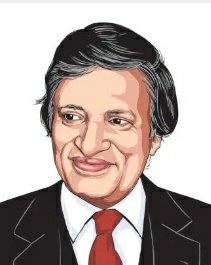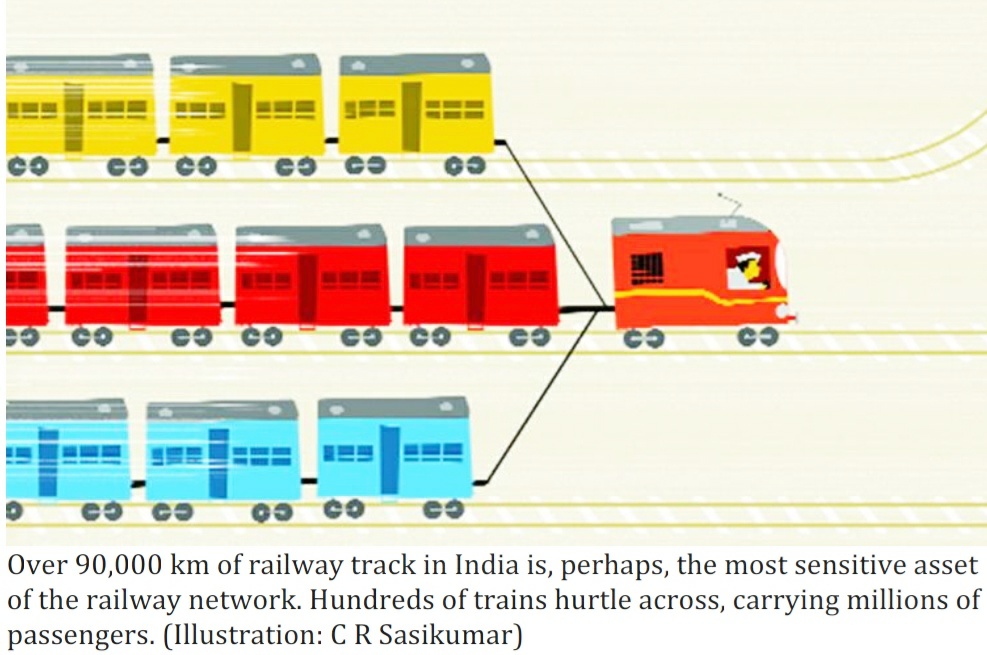If safety is not to be derailed
The departmentalism does not lie in merger of services and de-professionalization of the Ministry of Railways
Indian Railways needs to institute measures to enhance accountability. The so-called ‘anti-departmentalism’ move may not be the best way forward
Prakash Narain*

Derailments on the tracks of Indian Railways have always been a big technical and management challenge. In recent years, there have been a spate of ‘derailments’. On August 17, there was an unusually bad case of the derailment of Uttaranchal Express at Khatauli.
In the absence of a permitted block by the traffic department, the track repairing staff took the unacceptable risk of going ahead with the track repair instead of putting a restriction on the movement of trains in the interest of safety of passengers. The responsibility was rightly fixed on the civil engineering department staff and officials.
Over 90,000 km of railway track in India is, perhaps, the most sensitive asset of the railway network. Hundreds of trains hurtle across, carrying millions of passengers. The ‘braking distance’ is no more than about two-thirds of a kilometre (against only about 200 ft on the highways). Every inch of this track is to be watched meticulously.
The traffic load on the Indian Railways is ever increasing and the saturation level on its important routes is unduly high, leaving little cushion for maintenance.
Furthermore, the track is under greater pressure after the increase, in 2005, of the permissible loading capacity of each wagon based on wagon axle loads. Large projects to relieve the pressure, like the construction of dedicated freight corridors, will take time.
The question, at this stage is: In which direction should safety measures head?
In 2014, the government set up the Debroy Committee, whose primary terms of reference appeared to be to suggest measures to reduce the alleged phenomenon in the Indian Railway management system of ‘thinking in silos’.
In its report of 2015, wholesale structural changes were suggested, introducing what may be called ‘management generalism’. If accepted, this dilution of specialism or ‘professionalism’ would lead to the erosion of accountability and would be disastrous for railway management, particularly for railway safety.
The Debroy Committee Report on Railways (2015) recommends that departmentalism in railways (caused by ‘thinking in silos’) must be reduced through merger of Group ‘A’ Services either by (a) merger of all engineering services and civil services of the Indian Railways into one unified service, or (b) the merger of all engineering Group ‘A’ Services into one unified service and all civil Group ‘A’ Services into another unified service and giving up the Ministry of Railways cum Railway Board system (in which policy and secretarial powers are with the chairman and board members who are not ‘generalists’ but ‘professionals’ and replacing it by a conventional Ministry of Railways (and later by a ‘Ministry of Transport’) which will be part of the current ‘central staffing scheme’ manned by ‘generalists’ as in the case of other ministries.
The above recommendations, if accepted, will remove ‘professionalism’ from the top management level of the Indian Railways.
On the other hand, this is their unique strength as this enables the views of the railway ministry to be articulated effectively by the chairman and railway board members based on their specialised experience.
Incidentally, fixing of accountability, as in the case of the Khatauli accident, would not have been possible in the new system, as in that there may not be any chief civil engineer, chief operating manager or even a member civil engineering or member traffic etc available for fixing accountability and responsibility. They would be replaced by ‘generalists’ or ‘quasi generalists’.
The present ‘professional oriented system’ for the Indian Railways was adopted from the very outset because of the size of its operations and its unique role in the economy of the country. Sometimes, there have been problems. But the question is whether these have been because of the system or despite it.
A theory often propounded is that professionals are likely to have less vision. This is repudiated by various examples in science and technology management structures. The theory that specialist organizations like the Indian Railways lead to ‘managerial inbreeding’ is also fallacious. As is well known, inbreeding — biological or managerial — takes place in small groups of similar people. The Indian Railways are a huge group of dissimilar persons in nearly 20 disciplines interacting with each other.
The so-called ‘anti-departmentalism’ move like the merger of Group ‘A’ Services and de-professionalization of the Ministry of Railways would sound a death knell to the extremely crucial safety factor in the Indian Railways.
If there is a Unified Group ‘A’ service for the Indian Railways, as proposed by the Debroy Committee, and there is a vacancy of the post of a deputy chief engineer (track), are we going to fill up this post by a traffic officer or a mechanical engineer? This will be nothing short of catastrophic.
The ‘reduction in departmentalism’ cannot be made into a fetish to be pursued at all costs. The answer to departmentalism does not lie in merger of services and de-professionalization of the Ministry of Railways. Departments must not be gagged or demolished. They must be allowed to flourish and have their say for they may be giving expression to a genuinely valid factor, which may clash with equally valid points of view of other departments.
It is for the DRM/GM or the Railway Board to arrive at what may be called the Balance of Advantage Position (BAP), which will be in the best overall interest of the organization.
What is required is that major efforts be made towards improving the machinery for arriving at a BAP, including the use of new techniques for assessing aptitudes, capabilities etc.
In this, the procedure for selection to high-level posts may include limited interviews by special broad-based selection boards assisted by qualified technical teams.
*Prakash Narain, IRTS Rtd. was Chairman, Railway Board during 1986-87, Chairman National Transportation Safety Board. He worked earlier as Secretary, Shipping & Transport, Secretary Works & Housing & Adviser/Transport, Planning Commission of India.
Published by Indian Express
Dated: October 13, 2017.


